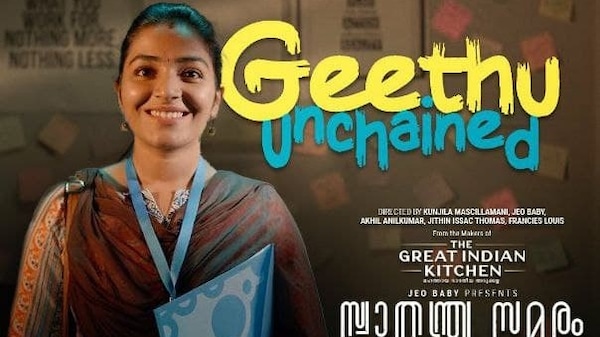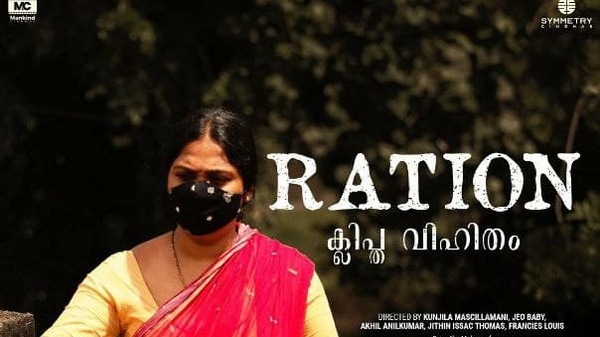Freedom Fight movie review: Jeo Baby’s hard-hitting anthology will leave you intrigued, influenced & impressed
The directorial team including Jeo Baby, Akhil Anilkumar, Kunjila Mascillamani, Francies Louis and Jithin Isaac Thomas have pulled off their best into bringing their own versions of ‘freedom fight’ onto the screen.

Last Updated: 07.40 AM, Feb 11, 2022
Story:
The anthology puts forward five tales, themed on freedom and the fight for the same. Set in five different contexts, it explores interpersonal relationships, class and gender politics, as well as family dilemmas.
Review:
Malayalam cinema is probably at its glorious era now, with many of its films and filmmakers boldly putting forth many redefining stories.The characters they create, are not afraid to question the age-old oppressions as well. Subsequently, the political loudness in the industry has also witnessed a steady growth, which is more inclusive. The latest anthology, Freedom Fight is an addition to the list, which is certain to take the industry to places. Helmed by five talented filmmakers, the anthology deals with the theme of freedom, as the title suggests.
The word ‘freedom’ is ambiguous. It has different definitions for different people, so do the fights for freedom. Team Freedom Fight puts forward five such narrations, where different people define their freedom, and choose their ways to fight for the same.
The directorial team including Jeo Baby, Akhil Anilkumar, Kunjila Mascillamani, Francies Louis and Jithin Isaac Thomas have pulled off their best into bringing their own versions of ‘freedom fight’ onto the screen. The casting is the top-notch highlight of each segment, where the makers have chosen perfect faces to address the subject. Actors including Rajisha Vijayan, Joju George, Siddhartha Siva, Srinda, Rohini and Unni Lalu are part of the cast and each of them deserves a larger piece of the cake for the movie’s success.
Geethu Unchained
Featuring Rajisha Vijayan in the lead, the segment is helmed by Akhil Anilkumar. Centering around a young woman and her relationship dilemmas, the plot is a realistic reflection of contemporary society, who doesn’t approve the supremacy of individual freedom over societal norms. Geethu, presented by Rajisha, is someone who has recently called off her engagement with her boyfriend, with whom she was in a long-term relationship. The woman could be seen put under the rulebooks by her family and others, making her a sinner for calling off an abusive relationship. The situation turns complex when a colleague proposes to her.

Geethu is not a new face to us. We certainly see many of them around and amongst ourselves. For a society that has been chained under the patriarchy for decades, it comes with no surprise that a woman is always questioned, judged and oppressed for the relationships she chooses to be in. Meanwhile, the relationships also turn patriarchal, where she is demanded to be ‘under’ the man in every situation. With this double oppression on her shoulders, it is definitely tough for her to see the chains she is tied to in the first place, before deciding to unchain herself.
Geethu Unchained puts forward all of these thoughts, along with sketching a quirky and brave fight of the woman, who unchains herself. The State Award-winning actress’ performance has made it perfect as well.
The Unorganised
It took a long time and the constant struggle of many, to bring the term ‘women at work’ forward. Making the workplaces equally fruitful for the workers, regardless of their gender, is something that is still in its lag. Kunjila Mascillamani’s Unorganised is an actual representation of the same, and stands out for many reasons. With strong storytelling, it also becomes one of the revolutionary and powerful cinematic attempts that profoundly deals with gender inequality.
The Unorganised follows a group of ladies, who struggle with a lack of washrooms/toilets at their workplaces. Even though the building licences have the provision for a toilet, the owners refuse to build one for their personal benefits. Perhaps, the story idea may appear to be a simple and close-knitted one. But the explorations made by the team with the story, and the problems addressed throughout the segment, are something that deserves huge applause.
The women characters, portrayed in the segment, are someone whom we all have seen in our daily lives - the ones who toil their sweat out being salespeople, tailors, shop helpers, and more. They come from the low slide of society, who lack education and are unaware of their own rights. When they are dismissed from their jobs for raising the need for a toilet and approaching the authorities, they turn to warriors and decide to fight for their rights.

The raw portrayal of the real struggles faced by women at the workplace is one of the elements that add points to The Unorganised. Srinda, who has essayed the lead role, has immersed herself in the character, and has brought the output, without missing a minute detail in body language or the accent.
The segment hits the right chords in addressing much more socio-political issues in a subtle way. This includes menstrual hygiene, the menstrual cup dilemma, queer representation and recognistion, and more.
The docu-fiction narrative style, cinematography, detailing and motifs are the next best areas, where the segment tops after the subject. Without any groovy background music or the support of tracks, the segment simply conveys the subject in a strong and intriguing manner. The acute portrayal of the incidents, character details, references, and the performances of the cast have fallen in the right place and in exact proportion, to make this segment an exceptional one.
Ration
Francies Louis’ segment presents two neighbours from different economic backgrounds, who bond over food. When the richer hands over a packet of seer fish to store it in the poorer’s refrigerator, little did we know the team is about to talk about the politics of freedom by placing the fish as a metaphor.

When the latter cooks the fish for her family, failing to know it was the neighbour’s, she finds herself in trouble. The expensive food item is too much to bear for the family who faces extreme difficulty to make ends meet at the end of the day. Through the woman’s actions to place the item back, the class politics between the rich and the poor are addressed. When economic privilege sets the upper class free, the same notion cages the lower class, making them grind themselves, only to satisfy the luxury needs of the privileged.
The storyline and the motifs are the two major feathers on the segment’s hat. The cast has handled it perfectly well too, making this a thoughtful and cinematically-rich film.
Old Age Home
Jeo Baby’s segment takes us to a middle-aged man, who is diagnosed with dementia. Joju George’s central character fighting for his own freedom amidst his wife and the newly-appointed home nurse is the crux of the story of this segment.

Though the character arcs seem disordered at some places, the total experience gives a warmth, with the impeccable performances of actors including that of Rohini. Titling a segment that happens inside a house as ‘Old Age Home’ makes sense when the backstories of the home nurse, the wife and the husband are read together.
The slow-paced segment is crafted in an exact Jeo Baby style, which brings a series of realistic scenes together, leaving the rest for the audience. The cinematography, and Joju’s efforts to bring the dilemmas of a dementia patient can be well appreciated. There are a few places where the movie will make you feel beautiful and heartfelt with the message it tries to convey and the way it is presented.
Pra. Thoo. Mu
Jithin Issac Thoma’s Pra. Thoo. Mu hits a different set of nerves, as it takes a moment for you to comprehend what you just saw. Bringing out the class politics by placing a ruler and his people as central characters, in the background of a septic tank cleaning, sounds startling, right?
The scenes of the segment are not an easy watch, as we see a rageful septic tank cleaner walking towards a minister’s house, only to end up in a tragic plight. Though the family is asked not to use the washroom ahead of the team cleaning the septic tank, the minister ends up using one. Obviously, the cleaner who lands in a ‘dirty trouble’ gets irked, and decides to fight for treating him like literal faeces.
Besides the visible physical oppression, the segment also addresses the deep-rooted class oppression subtly. When the minister abuses the cleaner by stressing upon the class difference, it shows him annoyed. It also shows how one finds it hard to consider them as equals, humans. When the ruler who is meant to ‘protect’ his people turns into a hunter, we can never know what happens then. Meanwhile, as art is meant to disturb the comforted and comfort the disturbed, the segment does both.
Siddharth Siva and Unni Lalu are the two gems of this film, who could be applauded particularly for what they have done. When the former brought out the pride, cruelty and egoistic side of the oppressor, the latter roared back with the rage, rigour and resentment of the oppressed. The gripping and captivating segment is undoubtedly one of the bests in the anthology.
Verdict:
Freedom Fight is an absolute watch, which deserves your total attention. The movie is an addition to the industry’s brave attempts to grow out of its comfort and safe zones.
Subscribe to our newsletter for top content, delivered fast.

